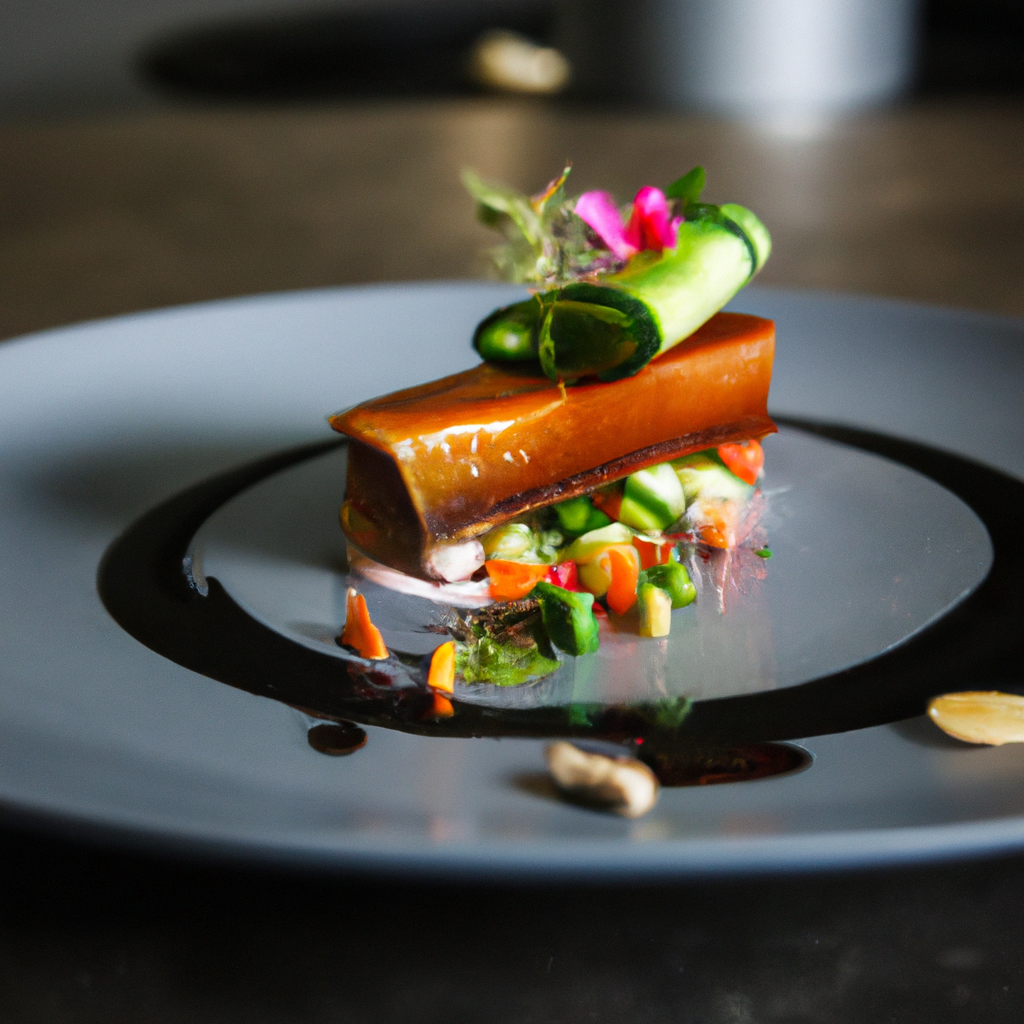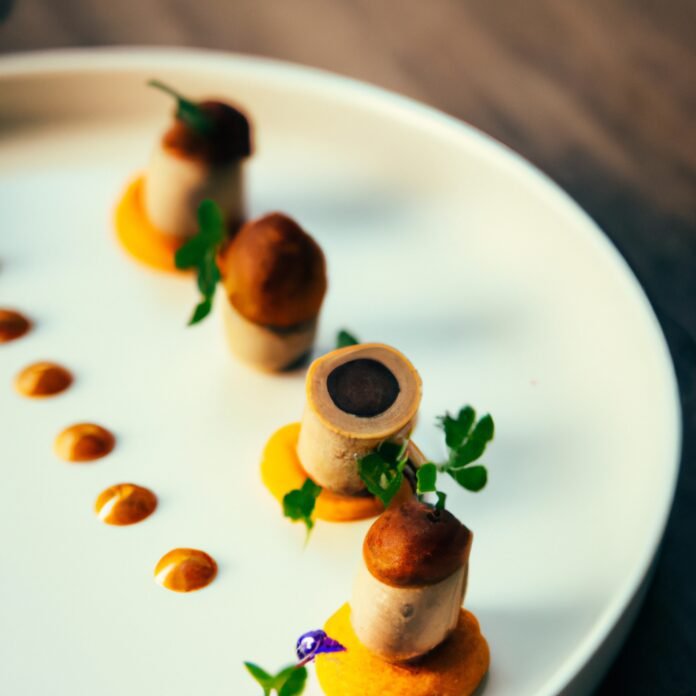Capturing the essence of a dish goes far beyond its flavors and aromas; it lies within the art of plating. As food enthusiasts, we are all aware of the great power a beautifully presented dish can wield over our senses. The meticulous arrangement of ingredients, the vibrant colors that dance on the plate, and the careful attention to detail make for an enticing visual experience. In the realm of food photography, mastering the art of plating is crucial in order to immortalize these gastronomic masterpieces through the lens. In this article, we delve into the realm of culinary artistry, uncovering presentation tips and techniques that will elevate your food photography to new heights. Get ready to embark on a visual journey and seize the opportunity to bring out the true magnificence of each culinary creation.
1. “Unleashing Culinary Creativity: Mastering the Art of Plating”
Embark on a journey that will tantalize your taste buds and ignite your imagination as we dive into the world of culinary creativity. In this section, we explore the intricate art of plating, a skill that elevates a simple dish into a masterpiece. Delve into the secrets and techniques used by professional chefs to create visually stunning and awe-inspiring plates that are as delicious as they are beautiful.
Discover how to make your food look just as good as it tastes by learning the principles of balance, color, and texture in plating. Learn how to create harmonious compositions that showcase each element of the dish in a visually pleasing way. From garnishes and sauces to the arrangement of ingredients, every element plays a crucial role in the overall presentation of the plate.
Unleash your creativity and experiment with different plating styles and techniques. Take inspiration from the masters of plating and discover how they use unconventional tools and ingredients to create unique and extraordinary presentations. Whether it’s the precise placement of a delicate herb or the drizzle of a vibrant sauce, every artistic decision contributes to the final masterpiece.
- Texture: Explore the importance of incorporating various textures into your plating, from crunchy to velvety smooth. Learn how contrasting textures can enhance the overall dining experience and make your dish more memorable.
- Color: Dive into the psychology of color and how it can impact the perception and enjoyment of food. Discover how to use a color palette to create visually striking plates that stimulate the senses.
- Form and Shape: Understand the role of shapes and forms in plating. Discover how different shapes can add dimension and visual interest to your dish, transforming it into a work of art.
Mastering the art of plating is not only reserved for professional chefs. With practice and guidance, you too can unleash your culinary creativity and create dishes that are not only delicious but visually captivating. So, join us on this culinary odyssey and let your imagination run wild as we delve into the art of plating.
2. “Elevate Your Food Photography: Expert Tips for Captivating Presentations”
When it comes to food photography, presentation is everything. A beautifully presented dish can make your audience salivate even before they take a bite. Whether you are a professional food photographer or simply want to up your Instagram game, here are some expert tips to help you create captivating food presentations:
1. Set the Stage: Create a visually appealing background by using props, such as wooden boards, colorful textiles, or rustic tableware. Experiment with different textures and patterns to complement the colors and textures of the food. Remember, the background should enhance the dish, not overpower it.
2. Master the Lighting: Lighting is key to creating stunning food photography. Natural light is your best friend. Set up your shoot near a large window or shoot outdoors during the golden hour. If you’re shooting indoors, try using diffused light for softer shadows. Position your dish at a 45-degree angle to the light source to achieve a wonderful play of highlights and shadows.
- Use a reflector: Bounce light back onto the dish using a reflector to fill in any harsh shadows. A simple white foam board can do wonders in creating a well-lit image.
- Experiment with different light temperatures: Try using warm or cool lighting to set the mood and enhance the food’s colors.
- Get creative with backlighting: Place a light source behind your dish to create a stunning glow around the edges, adding depth and dimension to your photo.
3. Rule of Thirds: Use the rule of thirds to create a visually appealing composition. Imagine a 3×3 grid over your frame and position your main subject along the intersecting lines. This technique helps create balance and adds interest to your photo.
4. Play with Depth of Field: Experiment with different depths of field to create unique and eye-catching images. Use a wide aperture (low f-stop number) to blur the background and draw attention to the main subject. Alternatively, a smaller aperture (high f-stop number) can ensure that the entire dish is in focus, highlighting all the delicious details.
5. Pay Attention to Styling: Make your dish look irresistible by paying attention to styling details. Fresh herbs, colorful garnishes, or a drizzle of sauce can add that extra element of visual appeal. Consider the overall composition, color palette, and textures. Don’t forget to tidy up any messy edges or fingerprints on the plate!
With these expert tips in mind, you’re now ready to take your food photography to new heights. Remember, practice makes perfect, so keep experimenting and refining your techniques. Let your creativity shine through your lens, and watch as your food captures the hearts (and stomachs) of your audience!
3. “From Kitchen to Canvas: Unveiling the Secrets Behind Stunning Food Plating”
Prepare to embark on a tantalizing journey as we delve into the captivating world of food plating. In this section, we will unlock the hidden secrets behind creating stunning and visually appealing dishes that are truly a treat for both the eyes and the palate.
From the artful arrangement of ingredients to the careful selection of colors and textures, food plating goes beyond mere presentation. It is an art form that engages all of our senses, allowing us to experience the symphony of flavors in a truly enchanting way. Get ready to discover the techniques used by professional chefs to transform a plate of food into a work of art.
One of the fundamental principles of food plating is balance. By combining elements of taste, texture, and color, chefs create a harmonious composition that is both visually stunning and perfectly complementary in flavor. The placement of each component is carefully considered, with every dish reflecting a carefully crafted balance between aesthetics and gastronomic delight.
Furthermore, the use of contrast plays a significant role in the art of food plating. By juxtaposing different colors, shapes, and sizes, chefs can elevate the visual impact of a dish. From the bright red of a juicy strawberry against a backdrop of vibrant green leaves, to the delicate drizzle of sauce that adds a burst of color to a pristine white plate, contrast is the secret ingredient that brings a dish to life.
Additionally, paying attention to garnishes is crucial in food plating. A carefully placed sprig of fresh herbs, a sprinkle of edible flowers, or a dusting of vibrant spices can add an extra layer of elegance and complexity to a dish. As they say, we eat with our eyes first, and the artful use of garnishes can instantly captivate our visual senses, enhancing the overall dining experience.
Finally, it is important to mention that innovation is key to pushing the boundaries of food plating. Chefs constantly experiment with new techniques and ideas to create unique and unforgettable presentations. Whether it’s the use of molecular gastronomy or the incorporation of unconventional serving vessels, innovative plating techniques have the power to surprise and delight diners, elevating the culinary experience to a whole new level.
4. “Picture Perfect: Enhancing Your Food Photography with Masterful Plating Techniques
Good food photography is not just about capturing an enticing dish, but also about presenting it in a visually stunning way. Masterful plating techniques can elevate your food photography to the next level, making your dishes look irresistible and leaving your audience craving more.
So, how can you enhance your food photography with these masterful plating techniques? Here are some creative ideas to spark your imagination:
- Play with Colors: Use vibrant ingredients to add pops of color to your dish. Contrast bright hues against neutral backgrounds to make the colors pop even more in your photographs.
- Focus on Texture: Experiment with different textures by combining crunchy, smooth, and velvety elements in your dish. The varying textures will add depth and visual interest to your photographs.
- Layering: Create visual depth by layering ingredients meticulously. Stack thin slices of vegetables or arrange them in a visually pleasing pattern to add dimensionality to your dish.
- Garnish Thoughtfully: Choose garnishes that enhance your dish both aesthetically and in flavor. Fresh herbs, edible flowers, or a sprinkle of spices can add that extra touch of elegance to your food photography.
Remember, plating is an art form, and it takes time and practice to master. Take inspiration from renowned chefs, food stylists, and great food photographers, but don’t hesitate to unleash your creativity and develop your own unique style.
By incorporating these masterful plating techniques into your food photography, you can create captivating images that not only make mouths water but also tell a story through their artistic presentation. So, get creative, experiment, and let your food photography shine through the art of plating!
Remember, presentation is key—although we can’t stress enough how important it is to make sure the food looks and tastes great, too! With that in mind, so long as you remember the tips provided in this article, you will be on track to plating perfection! Bon appétit!
